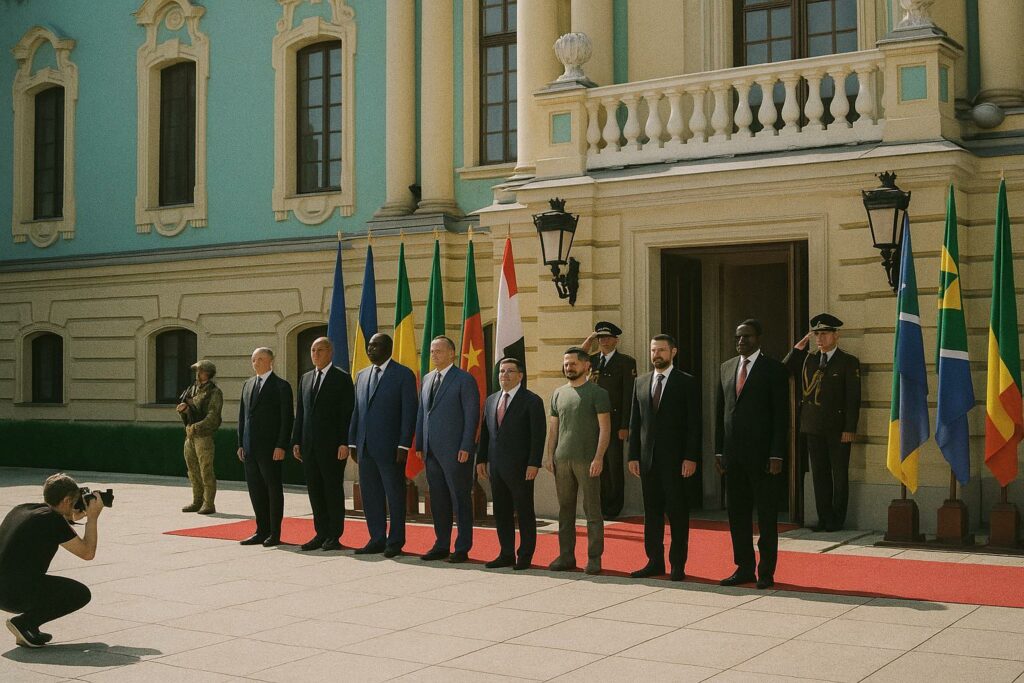A surge of blue-and-yellow pennants on African flagpoles
When Ukraine hoisted its flag over a modest villa on the outer ring-road of Nouakchott last December, few local observers expected more than a symbolic gesture. Yet the ceremony marked the eighth new African mission that Kyiv has opened since 2022, doubling its continental footprint in less than two years. According to figures from Ukraine’s Ministry of Foreign Affairs, embassies in Côte d’Ivoire, Botswana and the Republic of the Congo will follow, part of what Foreign Minister Dmytro Kuleba calls a “deliberate long-term pivot” (Interfax-Ukraine, 12 March 2024). The acceleration reflects a conviction in Kyiv that diplomatic numbers matter when resolutions on Russian aggression routinely reach the floor of the United Nations General Assembly.
Training grounds far from the Donbas
Beyond protocol and protocolary banquets, Ukraine is sending officers to Mauritania to train specialised desert units in explosive-ordnance disposal and counter-improvised-device tactics, reviving bilateral defence ties suspended in 2014. Ambassador Maksym Subkh, the special envoy for the Middle East and Africa, told reporters that the programme constitutes “preventive security assistance” aimed at shielding the country’s 2 237-kilometre border with Mali from spill-over violence. The initiative mirrors earlier Ukrainian deployments to the Central African Republic in the 2010s under UN blue helmets, experience that Kyiv now leverages as geopolitical capital.
Humanitarian grain and the politics of empathy
While Moscow courts African elites with subsidised fertiliser and photo-ops with President Vladimir Putin, Ukraine foregrounds a discourse of shared anti-colonial struggle and food solidarity. Under the ‘Grain from Ukraine’ scheme, announced by President Volodymyr Zelensky in November 2022, Kyiv has financed shipments totalling more than 170 000 tonnes of wheat and corn to drought-stricken Burkina Faso and Sudan (World Food Programme, February 2024). Ukrainian diplomats argue that such deliveries undermine the narrative that Western sanctions, rather than Russia’s blockade of the Black Sea, drive global food inflation. Nouakchott’s port has become an emblematic hub where sacks bearing trident insignia are distributed to Malian refugees, an image carefully amplified on both Mauritanian television and Ukrainian social media channels.
Enter the Africa Corps: Moscow’s asymmetric shadow
Ukraine’s overtures unfold against the backdrop of Russia’s rebranded Wagner network, now operating as the Africa Corps under the supervision of the Russian Ministry of Defence. Analysts at the International Crisis Group estimate that 2 500 Russian contractors are present across Mali, Burkina Faso and Niger, providing regime security in exchange for mining concessions. Western diplomats in Bamako describe a ‘security market’ in which juntas auction legitimacy to the highest bidder. Kyiv’s strategists contend that exposing the transactional nature of Russian support can erode Moscow’s soft-power advantage. Yet recent polling by Afrobarometer shows that positive perceptions of Russia in francophone West Africa still exceed 60 percent, a reminder that narratives alone rarely uproot entrenched grievances.
Balancing acts among Sahel capitals
Mauritania welcomes Ukrainian trainers yet simultaneously buys Russian diesel at favourable rates. Senegal condemns the invasion of Ukraine at the UN but accepts Russian grain donations. Burkina Faso’s military leader, Captain Ibrahim Traoré, calls for a ‘multipolar world’ while discreetly authorising Ukrainian humanitarian flights. Such hedging underscores the agency of Sahel states navigating a fragmented international order, and it exposes Kyiv to the risk of over-promising in a region where expectations of security dividends are acute and immediate.
Echoes in European and transatlantic policy circles
For European Union policymakers alarmed by jihadist advances only 2 000 kilometres south of the Mediterranean, Ukraine’s activism is viewed with cautious approval. A senior EU official in Brussels notes that ‘every Ukrainian medic in Timbuktu frees an overstretched European trainer for another mission’ (private interview, April 2024). Washington, preoccupied with Gaza and Indo-Pacific contingencies, privately encourages Kyiv’s outreach as a cost-effective method of contesting Russian influence, though Congressional scepticism about additional foreign assistance to Ukraine may limit the programme’s scalability.
Strategic dividends and the limits of symbolism
Can a country under existential military pressure afford a global diplomatic campaign? In budgetary terms, Kyiv’s Africa portfolio remains modest: fewer than 150 diplomats and an estimated 40 million dollars in 2024 appropriations, according to Ukraine’s parliamentary budget committee. Yet the symbolic return may be significant. At the UN last year, Gabon, Côte d’Ivoire and Sierra Leone co-sponsored the resolution calling for ‘just and lasting peace’ in Ukraine; none had done so in 2014. Still, traction is fragile. A single coup or cabinet reshuffle can redraw allegiances overnight, as Niger’s July 2023 putsch demonstrated.
Contours of an emerging front line
The Sahel is unlikely to decide the outcome of battles around Avdiivka, but it may shape the diplomatic arithmetic that determines sanctions regimes, war-crime prosecutions and reconstruction funds. By entwining its fate with African stability, Ukraine implicitly invites Africa to claim a voice in European security debates. Conversely, Moscow’s Africa Corps wagers that securing gold mines and presidential palaces will compensate for battlefield reverses in Donetsk. The stakes, then, are multidimensional: raw materials, maritime corridors, votes in multilateral fora and, perhaps most intangibly, the narrative of whose cause better resonates with post-colonial aspirations.
A race where time favours neither contestant
With Western budgets tightening and Russian forces digging in for a protracted conflict, both Kyiv and Moscow may discover that influence purchased in the Sahel is hostage to local dynamics they can barely control. Ukraine’s embassy in Nouakchott may well outlast the current junta in Bamako, or it might be closed if a future Ukrainian administration deems distant engagements unsustainable. What is certain is that Africa now occupies a seat at the high table of Europe’s security conversations. Whether the continent will enjoy that prerogative on its own terms, rather than as an arena for external rivalry, remains the unresolved question hovering over the desert winds.

